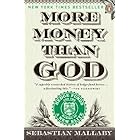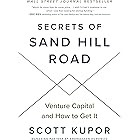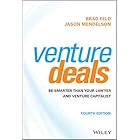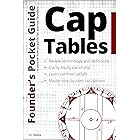| Print List Price: | $31.00 |
| Kindle Price: | $9.99 Save $21.01 (68%) |
| Sold by: | Penguin Group (USA) LLC Price set by seller. |
Your Memberships & Subscriptions

Download the free Kindle app and start reading Kindle books instantly on your smartphone, tablet, or computer - no Kindle device required.
Read instantly on your browser with Kindle for Web.
Using your mobile phone camera - scan the code below and download the Kindle app.

OK
 Audible sample Sample
Audible sample Sample 


The Power Law: Venture Capital and the Making of the New Future Kindle Edition

Explore your book, then jump right back to where you left off with Page Flip.
View high quality images that let you zoom in to take a closer look.
Enjoy features only possible in digital – start reading right away, carry your library with you, adjust the font, create shareable notes and highlights, and more.
Discover additional details about the events, people, and places in your book, with Wikipedia integration.
Named a Best Book of 2022 by The Economist
“A gripping fly-on-the-wall story of the rise of this unique and important industry based on extensive interviews with some of the most successful venture capitalists.” - Daniel Rasmussen, Wall Street Journal
“A must-read for anyone seeking to understand modern-day Silicon Valley and even our economy writ large.” -Bethany McLean, The Washington Post
"A rare and unsettling look inside a subculture of unparalleled influence.” —Jane Mayer
"A classic...A book of exceptional reporting, analysis and storytelling.” —Charles Duhigg
From the New York Times bestselling author of More Money Than God comes the astonishingly frank and intimate story of Silicon Valley’s dominant venture-capital firms—and how their strategies and fates have shaped the path of innovation and the global economy
Innovations rarely come from “experts.” Elon Musk was not an “electric car person” before he started Tesla. When it comes to improbable innovations, a legendary tech VC told Sebastian Mallaby, the future cannot be predicted, it can only be discovered. It is the nature of the venture-capital game that most attempts at discovery fail, but a very few succeed at such a scale that they more than make up for everything else. That extreme ratio of success and failure is the power law that drives the VC business, all of Silicon Valley, the wider tech sector, and, by extension, the world.
In The Power Law, Sebastian Mallaby has parlayed unprecedented access to the most celebrated venture capitalists of all time—the key figures at Sequoia, Kleiner Perkins, Accel, Benchmark, and Andreessen Horowitz, as well as Chinese partnerships such as Qiming and Capital Today—into a riveting blend of storytelling and analysis that unfurls the history of tech incubation, in the Valley and ultimately worldwide. We learn the unvarnished truth, often for the first time, about some of the most iconic triumphs and infamous disasters in Valley history, from the comedy of errors at the birth of Apple to the avalanche of venture money that fostered hubris at WeWork and Uber.
VCs’ relentless search for grand slams brews an obsession with the ideal of the lone entrepreneur-genius, and companies seen as potential “unicorns” are given intoxicating amounts of power, with sometimes disastrous results. On a more systemic level, the need to make outsized bets on unproven talent reinforces bias, with women and minorities still represented at woefully low levels. This does not just have social justice implications: as Mallaby relates, China’s homegrown VC sector, having learned at the Valley’s feet, is exploding and now has more women VC luminaries than America has ever had. Still, Silicon Valley VC remains the top incubator of business innovation anywhere—it is not where ideas come from so much as where they go to become the products and companies that create the future. By taking us so deeply into the VCs’ game, The Power Law helps us think about our own future through their eyes.
- LanguageEnglish
- PublisherPenguin Press
- Publication dateFebruary 1, 2022
- File size16168 KB
Customers who bought this item also bought
Editorial Reviews
Review
“Meticulously researched account . . . The book offers a satisfying look at how the sausage is made at some of the most powerful investment firms on the planet.”—New York Times
“Thoroughly magnificent. . . . Seriously great, and wildly important.” —Forbes
“Sebastian Mallaby is the master of unspooling human drama from financial systems. Here, the venture capitalists are the protagonists. Whether it’s financiers scrambling to court a pajama-wearing young Mark Zuckerberg or venture capitalist Bill Gurley’s efforts to oust Uber founder Travis Kalanick from the company, the stories are almost Shakespearean in their depictions of ambition, jealousy and ego.” —NPR, “Books We Love 2022”
“A must-read for anyone seeking to understand modern-day Silicon Valley and even our economy writ large . . . Most people who write about Silicon Valley do so from the viewpoint of entrepreneurs who built companies with the backing of venture capitalists. Mallaby writes from the perspective of the venture capitalists themselves. He tells his story through an accumulation of smaller stories, each one phenomenally detailed and engaging.” —Bethany McLean, The Washington Post
"A gripping fly-on-the-wall story of the rise of this unique and important industry based on extensive interviews with some of the most successful venture capitalists . . . Mr. Mallaby writes a fast-paced narrative. He also has a journalist’s eye for revealing details” —Daniel Rasmussen, Wall Street Journal
“Sweeping and authoritative . . . tells an undercovered tale. . . . A worthy successor to More Money Than God.” —Financial Times
“Well-researched book, leavened by lively portraits of leading figures.”—The Economist
“Sebastian Mallaby is the master of unspooling human drama from financial systems. Here, the venture capitalists are the protagonists. Whether it’s financiers scrambling to court a pajama-wearing young Mark Zuckerberg or venture capitalist Bill Gurley’s efforts to oust Uber founder Travis Kalanick from the company, the stories are almost Shakespearean in their depictions of ambition, jealousy and ego.”—Darian Woods, The Indicator
“Sebastian Mallaby's The Power Law: Venture Capital and the Making of the New Future is a rip-roaring read full of eccentric geniuses . . . A smart and consequential public intellectual, Mallaby has formulated a smart recipe to restore America (and the world) to vibrant equitable prosperity. He makes the case vividly in a new book which should be on every congressional desk . . . It may be the most informative and engaging economic narrative history since Liaquat Ahamed's Lords of Finance: The Bankers Who Broke the World which won the 2010 Pulitzer Prize in history.” —NewsMax
“How does the venture capital industry work its wonders? Is there a replicable formula for successful VC investing, or is it just a matter of being in the right place at the right time? And how secure is Silicon Valley’s dominance of the industry? Sebastian Mallaby’s absorbing new book, The Power Law: Venture Capital and the Art of Disruption seeks to answer these questions. . . . He brings his trademark mixture of exhaustive research and clear analysis to his most interesting subject so far.” —Adrian Wooldridge, Bloomberg
“As we face urgent man-made existential challenges from climate change to economic inequality, Sebastian Mallaby shows that the capitalists of Silicon Valley are shaping the future in ways few understand. In The Power Law he takes us inside their rarified world, showing the possibilities and shortcomings of their big egos and big bets. Mallaby's deep access enables us to get a rare and unsettling look inside a subculture of unparalleled influence.” —Jane Mayer, Chief Washington Correspondent, The New Yorker
“Absorbing.” —Reuters
“The Power Law should be on every tech founder’s—and self-reflective VC’s—reading list . . . Go and buy The Power Law. It is a fantastic account of how American venture capital has developed and some of the most important rules that govern it. Let’s use Mallaby’s brilliantly executed observations of VC as an opening for a long-overdue, ongoing debate and continue our scrutiny of the kingmakers’ world.” —Sifted
“Mallaby writes with humor and historical sweep . . . His account is immensely enriched by interviews with most if not all of the rainmakers in venture capital.” —Prospect Magazine
“Venture capital has influenced the American economy for over half-a-century now, and finally we have a book of exceptional reporting, analysis and storytelling to bring that history to life. What makes Sebastian Mallaby’s The Power Law a classic is how deeply it takes us into VC's defining successes and failures—which are much harder to get anyone to talk frankly about. I’m not sure this is the book of VCs' dreams, but it’s what the rest of us have been waiting for.” —Charles Duhigg
“Returning to the rough and tumble of business, January also brings The Power Law (Allen Lane), in which author Sebastian Mallaby sets off into the world of venture capital and the strange bunch of financiers behind some of the most successful companies. It’s a tale of triumphs but also major failures, hubris and jaw-dropping eccentricity.” —Financial Times, Spring Preview
“Heavyweight and richly detailed, [The Power Law] is both a careening ride through the chaos of startup culture and a sober assessment of how the relationship between founders and their financiers has evolved.” —Strategy and Business
“A lucid, thoughtful, and entertaining account of high-wire capitalism at work.” —Publishers Weekly
“Indispensable.” —Kirkus
“In this fascinating study of venture capitalists, Sebastian Mallaby explains why they invest with the sole purpose of winning the jackpot while the rest of us are advised to invest cautiously. A compelling story of flesh-and-blood financiers, sprinkled with insights from which all economists could learn.” —Mervyn King, former Governor of the Bank of England
“If you can read only one book on venture capital, this is the one. The Power Law narrates the evolution of venture capital from its origins in Silicon Valley to its emergence in China by following the ambitious and often idiosyncratic investors who finance risky new ventures while recognizing that success is rare, but transformative. The book is a fascinating read, and illustrates well one of its core themes, that venture capital is a network that straddles and offers the virtues of both markets and corporations.” —AnnaLee Saxenian, dean of the School of Information at University of California, Berkeley
“A fascinating journey through the tightly networked world of the venture capitalists who make Silicon Valley tick, from the scrappy dealmakers of the 1960s to the high-flying global investors of today. Filled with eye-opening case studies and vivid personalities, frank in its analysis of the industry’s greatest strengths and most dangerous blind spots, The Power Law is essential reading for understanding our tech-driven economy and where it might go next.” —Margaret O’Mara, author of The Code
“The Power Law is a remarkable book. It takes us inside venture capital from its origins with a handful of restless risk-takers to today’s powerhouses that reshape our world. Both a formidable researcher—he has gotten key players to talk with amazing candor—and a gifted storyteller, Mallaby captures the drama and clashes of an extraordinary gallery of people who—with insight and instincts, appetite for risk and tolerance for failure, unforgiving ego and relentless ambition—make big bets in the face of huge uncertainty. Yet all of them must ultimately answer to the ‘power law’—the reach for outsized returns. Mallaby does not shy away from detailing what has gone wrong, but he sees the ‘triumph of the network’ of Silicon Valley as also a triumph for the United States—though one now challenged by the mirror image that is rising up in China. The Power Law is an important book, for sure. It is destined to be of wide impact and lasting influence.” —Daniel Yergin, Pulitzer Prize-winning author of The Prize and The New Map
“Everyone talks about venture capital. We glorify it, we vilify it, and everywhere outside Silicon Valley envies it. At last we have a storyteller with the intelligence to understand venture capital, the diligence to dig out some astonishing tales, and the eloquence to make the journey of discovery such a pleasure. This is a superb book.” —Tim Harford, author of The Data Detective
About the Author
Excerpt. © Reprinted by permission. All rights reserved.
Introduction
Unreasonable People
Not far from the headquarters of Silicon Valley's venture-capital industry, which is clustered along Palo Alto's Sand Hill Road, Patrick Brown strode out into his yard on the Stanford University campus. Atop a little hill behind his house, Brown got down on his hands and knees, a shaggy fifty-four-year-old professor in a T-shirt, peering at the vegetation through rounded glasses. Proceeding delicately, like a detective collecting samples that might yield a vital clue, Brown began digging out the roots of some wild clover plants. It might impress the ordinary gardener to know that those roots would soon yield $3 million.
Brown was one of the world's leading geneticists. In 1995, his lab had published pioneering work on DNA microarrays, which help distinguish between normal and cancerous tissue. He had been elected to the National Academy of Sciences and the National Academy of Medicine. He was the recipient of a Howard Hughes award, which guaranteed no-strings-attached research funding. But his objective on that hilltop had nothing to do with genetics. The year was 2010, and Brown was using a sabbatical to plot the downfall of the meat-industrial complex.
A friend had set him on this path by means of a stray comment. Possessed of a keen environmental conscience, Brown had been worrying that animal husbandry occupied one-third of the world's land, causing significant greenhouse gas emissions, water degradation, and a loss of biodiversity. The planet was clearly going to need a better kind of food for the growing population of the twenty-first century. Then Brown's friend mentioned that if you could make a vegetarian burger that tasted better than a beef burger, the free market would magically take care of the problem. Adventurous restaurants would serve it, and then McDonald's would serve it, and pretty soon you could eliminate meat from the food system.
The more Brown pondered this, the more he grew agitated. If you could make a yummier vegetarian burger? Of course you could make a yummier vegetarian burger! Why was nobody treating this as a solvable problem? "People just figured we have this insanely destructive system and it's just never going to go away," Brown fumed. "They thought, 'Bummer, but there you are.'"
In most places and at most points in human history, Brown's epiphany would have been inconsequential. But, as Brown himself reflected later, he had "the very good fortune of living in the epicenter of venture capital." Because Stanford sat at the heart of Silicon Valley, its golf course laid out along the edge of Sand Hill Road, Brown was digging up his yard with a clear purpose. Those clover roots contained heme, an iron-carrying molecule found in hemoglobin, which gives blood its red color. If Brown could show how this plant molecule could mimic the properties of bloody meat, there was a good chance that a venture capitalist would fund a plantburger company.
Brown dissected the clover roots with a razor blade and blended them up to extract and culture the juices. Pretty soon, he had what he needed to fashion a vegetarian burger that smelled and sizzled and dripped and squished like 100 percent Grade A beef. "I got to a point where, though I didn't have much data, I'd enough to go and talk to some venture-capital companies-of which there are a ridiculous number in Silicon Valley-and hit them for some money."
A scientist friend mentioned that Vinod Khosla, a venture capitalist who ran the eponymous Khosla Ventures, was interested in environmentally friendly, "cleantech" projects. What he didn't mention was that Khosla was also a preacher of the Valley's most bracing creed: the belief that most social problems can be ameliorated by technological solutions, if only inventors can be goaded to be sufficiently ambitious. "All progress depends upon the unreasonable man," the "creatively maladjusted," Khosla declared, borrowing eclectically from George Bernard Shaw and Martin Luther King Jr. "Most people think improbable ideas are unimportant," he loved to add, "but the only thing that's important is something that's improbable." If you were going to pitch Khosla an invention, it had better not fall into the incremental category he called "one sheet of toilet paper, not two." Khosla wanted radical dreams, the bolder and more improbable the better.
Brown rode a bicycle to Khosla's office, a sleek designer building of glass and wood. He had prepared a slide deck that he admitted "in retrospect was ridiculous." The first slide laid out his goal: rendering the entire meat industry redundant. Those rounded glasses-the John Lennon, Steve Jobs, visionary look-seemed altogether appropriate.
Khosla has large eyes and chiseled features and thick, cropped gray hair. He fixed his visitor with an impish stare.
"That's impossible!" he said, delightedly.
Silently, Khosla was thinking to himself, "If there is a one-in-a-hundred chance that this works, this is a shot worth taking."
Brown explained how he proposed to out-beef the beef industry. He would break the challenge down into its component parts: how to replicate the smell, the consistency, the taste, and the appearance of a real beef burger. Once you analyzed each question separately, an apparently impossible ambition became a set of soluble problems. For example, the clover-root juices would drip like blood onto hot coals; they would turn from red to brown as they sizzled on a barbecue. Dr. Frankenstein had met Ray Kroc. Nobody would eat ground cow flesh again.
Khosla ran through a test that he applied to supplicants. The onus was not on Brown to prove that his idea would definitely work. Rather, the question was whether Khosla could come up with a reason why it obviously could not work. The more Khosla listened to his visitor, the less he could rule out that he was onto something.
Next, Khosla sized up Brown as a person. He was fond of proclaiming a Yoda approach to investing: empower people who feel the force and let them work their magic. Brown was evidently brilliant, as his credentials as a geneticist demonstrated. He was gate-crashing a new field, which meant he was unburdened by preconceptions about what conventional wisdom deemed possible. Moreover, Brown was clearly as determined as he was bright: he was ready to leave his academic perch-the prestige of a Stanford professorship, the blank check from the Howard Hughes foundation. All in all, Brown fitted Khosla's archetype of the ideal entrepreneur. He had the dazzling intellect, the willingness to put his own neck on the line, the glorious hubris and na•vetŽ.
There was one last test that Khosla cared about. If Brown managed to produce a yummy plantburger, would he generate profits that would be commensurately succulent? Khosla routinely put capital behind moon shots with a nine-in-ten chance of failure. But the low probability of a moon landing had to be balanced by the prospect of a large payout: if the company thrived, Khosla wanted to reap more than ten times his investment-preferably, much more than that. There was no point gambling for success unless the success was worth having.
Brown had gotten to his final slide, where he stuck all the mundane market data that failed to interest a scientist. He noted matter-of-factly that "it's a trillion-and-a-half-dollar global market being served by prehistoric technology."
Khosla latched on. If plant patties could mimic the experience that customers expected from beef-the taste, the consistency, the browning, and the bleeding as you flipped the burger on the grill-the potential was cosmic.
Brown looked Khosla in the eyes. "I promise to make you even more insanely rich than you already are, if you give me this money," he told him.
At that, Khosla bet $3 million on Impossible Foods, as Brown fittingly named his company. Recounting this story in 2018, Khosla happily noted Impossible's progress since 2010: the company would soon have more than $100 million in annual revenues. But the main message that Khosla emphasized transcended dollars and cents. "You can imagine, if Pat fails, the hubris of saying he could eliminate animal husbandry; he'll be mocked for that," Khosla observed. But, he continued, the mockery would be misplaced. Which is better: to try and fail, or to fail to try? Reasonable people-well-adjusted people, people without hubris or na•vetŽ-routinely fail in life's important missions by not even attempting them; the way Khosla saw things, Brown should be hailed as a hero, whatever happened to his company. Truly consequential changes are bound to seem outrageous when they are first imagined by messianic inventors. But there is no glory in projects that will probably succeed, for these by definition won't transform the human predicament.
Khosla was himself an unreasonable man, creatively maladjusted. As a boy in his native India, he rebelled against his parents' religion, declined to follow his father into the army, and refused an arranged marriage. On his wedding day, he set his watch alarm, declaring that the religious portion of the ceremony had to be done inside thirty minutes. As soon as he earned an engineering degree, he left for the United States, where he studied more engineering at Carnegie Mellon University. After that, he set his sights on Stanford Business School; learning that he needed two yearsÕ work experience to qualify for admission, he did two jobs at once and declared after one year that he had met the requirement. In 1982, after completing his business degree, Khosla teamed up with three computer scientists to found Sun Microsystems, whose powerful workstations stamped their mark on the evolution of computing. Cocky and obnoxious, Khosla was soon fired. He became a venture capitalist.
Joining the storied venture partnership of Kleiner Perkins, Khosla discovered his true métier. His unreasonable impatience-his determination that anything might be possible and everything should work his way-made him one part tyrant, two parts visionary. In later life, he bought a village with forty-seven cottages on the California coast and fought a series of losing court cases to block public access to the beach, even though he never found time to spend the night there-not once, ever. But he channeled his contempt for conventional thinking into a series of dazzling investments, frequently losing his money and sometimes generating bonanzas. By the time he met Patrick Brown, everything about Khosla-his risk appetite, his love of hubris, his quest for improbable ideas-made him the living embodiment of the power law, the most pervasive rule in venture capital.
Many phenomena in life are normally distributed: nearly all the observations in a data set cluster around the average. For example, the average height of an American man is five feet ten inches, and two-thirds of American men are within three inches of that average. When you plot height on an x axis and the probability that a man will have that height on a y axis, what you see is a bell curve: the greatest probability is that a man's height will be the average height, and the probabilities decline as you move away from that midpoint. The chances of meeting a man whose height is ten inches from the average-that is, less than five feet or more than six feet eight-are exceedingly small. Further away from the mean, the thin tails of the curve taper toward zero.
Not all phenomena follow this pattern, however. A chart showing the wealth of Americans rather than their height looks very different. People who are richer than the median are sometimes vastly richer, so the far right side of the wealth chart features an extended fat tail between the curve and the x axis. Because the very rich are numerous enough and wealthy enough to impact the average for the whole nation, the average is pulled to the right: unlike in a normal distribution, the mean is higher than the median. In a normal distribution, moreover, you can remove the biggest outlier from a sample without affecting the average: if a seven-foot NBA star walks out of a cinema, the average height of the remaining ninety-nine movie-watching men falls from five feet 10 inches to five feet 9.9 inches. In a non-normal, skewed distribution, in contrast, the outliers can have a dramatic effect. If Jeff Bezos walks out of the cinema, the average wealth of those who stay behind will plummet.
This sort of skewed distribution is sometimes referred to as the 80/20 rule: the idea that 80 percent of the wealth is held by 20 percent of the people, that 80 percent of the people live in 20 percent of the cities, or that 20 percent of all scientific papers earn 80 percent of the citations. In reality, there is nothing magical about the numbers 80 or 20: it could be that just 10 percent of the people hold 80 percent of the wealth, or perhaps 90 percent of it. But whatever the precise numbers, all these distributions are examples of the power law, so called because the winners advance at an accelerating, exponential rate, so that they explode upward far more rapidly than in a linear progression. Once Jeff Bezos achieves great riches, his opportunities for further enrichment multiply; the more a scientific paper is cited, the better known it is and the more likely it is to attract further citations. Anytime you have outliers whose success multiplies success, you switch from the domain of the normal distribution to the land ruled by the power law-from a world in which things vary slightly to one of extreme contrasts. And once you cross that perilous frontier, you better begin to think differently.
The rethinking required is especially pronounced in finance. Investors who focus on currencies, bonds, and stock markets generally assume a normal distribution of price changes: values jiggle up and down, but extreme moves are unusual. Of course, extreme moves are possible, as financial crashes show. But between 1985 and 2015, the S&P 500 stock index budged less than 3 percent from its starting point on 7,663 out of 7,817 days; in other words, for fully 98 percent of the time, the market is remarkably stable. Because the distribution of price changes in these widely traded markets approaches normal, speculators concentrate on harvesting profits from the modest fluctuations that occur on most days. Like the seven-foot NBA star in the cinema, unexpectedly large price jumps are rare enough and moderate enough that they do not affect the average.
Now consider the returns in venture capital. Horsley Bridge is an investment company with stakes in venture funds that backed 7,000 startups between 1985 and 2014. A small subset of these deals, accounting for just 5 percent of the total capital deployed, generated fully 60 percent of all the Horsley Bridge returns during this period. (To put that in context, in 2018 the top-performing 5 percent of subindustries in the S&P 500 accounted for only 9 percent of the index's total performance.) Other venture investors report even more skewed returns: Y Combinator, which backs fledgling tech startups, calculated in 2012 that three-quarters of its gains came from just 2 of the 280 outfits it had bet on. "The biggest secret in venture capital is that the best investment in a successful fund equals or outperforms the entire rest of the fund," the venture capitalist Peter Thiel has written. "Venture capital is not even a home-run business," Bill Gurley of Benchmark Capital once remarked. "It's a grand-slam business."
Product details
- ASIN : B0942SZJ8H
- Publisher : Penguin Press (February 1, 2022)
- Publication date : February 1, 2022
- Language : English
- File size : 16168 KB
- Text-to-Speech : Enabled
- Screen Reader : Supported
- Enhanced typesetting : Enabled
- X-Ray : Enabled
- Word Wise : Enabled
- Sticky notes : On Kindle Scribe
- Print length : 496 pages
- Page numbers source ISBN : 0241356520
- Best Sellers Rank: #74,214 in Kindle Store (See Top 100 in Kindle Store)
- Customer Reviews:
About the author

Sebastian Mallaby is the Paul Volcker Senior Fellow in International Economics at the Council on Foreign Relations and a Washington Post columnist. He spent thirteen years on The Economist magazine, covering international finance in London and serving as the bureau chief in southern Africa, Japan, and Washington. He spent eight years on the editorial board of The Washington Post, focusing on globalization and political economy. His previous books are The World's Banker (2004), which was named as an Editor's Choice by The New York Times, and After Apartheid (1992), which was a New York Times Notable Book.
Customer reviews
Customer Reviews, including Product Star Ratings help customers to learn more about the product and decide whether it is the right product for them.
To calculate the overall star rating and percentage breakdown by star, we don’t use a simple average. Instead, our system considers things like how recent a review is and if the reviewer bought the item on Amazon. It also analyzed reviews to verify trustworthiness.
Learn more how customers reviews work on Amazon-
Top reviews
Top reviews from the United States
There was a problem filtering reviews right now. Please try again later.
I would have given 5 stars except he says the word “duly” about 30 times and he makes a huge issue out of the fact that most VC workers are men.
That said this book feels like it written by committee, each responsible for a third of the book.
The first third of the book, a survey of the history of venture capital to the end of the 20th century is a good overview, albeit one with a very parochial view. All of these early histories, this one included, offer a very limited perspective on the role of the military in funding/founding Silicon Valley in the midst of the Cold War. It’s not unexpected as most of those efforts are buried in projects and reports that only now are becoming declassified. But their impact was substantial on the early days of Silicon Valley. To be fair, it would be extremely difficult for academic historians who didn’t have code word clearances to understand this. So far none have.
As the second third of the book crosses into the 21st century it loses its dispassionate perspective of trying to find meaning and context and instead reads as a paean to Sequoia Capital and Accel. This might be an artifact of the narrative as the book traces the evolution of venture through the lens of individual Venture Capitalists and their firms (Patterson and Swartz, Moritz and Leone/Morritz, et al.). However, I found this section obsequious to the point you’d think the author was an investor in their funds.
The last third of the book provides valuable insight on the evolution and growth of venture capital in China. It’s one of the few coherent retrospectives about the growth of Chinese VC I’ve read.
Finally, two points worth noting. The first, is that this is not a history of all of venture capital. In the 20th century most VC firms invested in all forms of technology; hardware, software and starting in the 1980’s, life sciences (therapeutics, devices and diagnostics.) But by the beginning of the 21st century most firms specialized. However in reading the book you’d have no idea that Life Science VC’s exist. Yet arguably the companies they’ve funded have provided more value to society than every social media investment ever made.
As a closing note, and this has nothing to do with the value of the book, is the authors unabashed view that venture capital is just fine as is, don’t screw with it. Yet at the end of the day venture for all it has done in creating an innovation ecosystem, is an unregulated financial asset class without any morals. It’s equally happy funding Apple and Moderna (Covid Vaccines) as it has Juul (addicting teens to tobacco) or Facebook (the Purdue Pharma of social media.)
Worth a read.
Top reviews from other countries
Reviewed in Brazil on November 1, 2023

The power law occurs when the winners advance at an accelerating and exponential rate, rather than a linear one. The 80:20 rule such as the one where 20% of the population own 80% of the wealth is one example of this. The book covers the various phases of venture investments in detail, starting with those by rich entrepreneurs to early innovations such as pooled capital (from limited partners) and activism capital (where investors played a key role in choosing managers and strategies), the era of creation of networks and “coopetition” (co-operation and competition at the same time), the no-holds-barred growth-investing style perpetuated by Softbank’s Masayoshi Son in the late 1990s, structured angel investments by the likes of Y Combinator, a tilt in the balance towards founders brought about by companies such as Google and Facebook and finally, the return to activist investing in companies such as WeWork and Uber. The book covers the history in multiple geographies, mainly in the US and in China, and to a small extent, in India as well. It also covers the history of several of the more significant firms such as Kleiner Perkins and Sequoia.
The role and importance of venture capital is a hotly debated topic. While it cannot be denied that it has played and continues to play an important role in our progress, do venture capitalists create innovation or do they merely show up for it? Could they have done more to avoid some of technology’s adverse social impact or to encourage technologies such as greentech? Mallaby largely speaks out in favour of the venture capitalists but this part of the book is not as fleshed out as the rest of it. He argues that the future can only be discovered and not predicted, and this is the only form of capital that can enable this discovery by willing to take a large amount of risk (it was hence initially referred to as adventure capital). Mallaby argues that venture capitalists succeeded more due to skills than luck and companies such as Cisco and Google became what they are due to extensive coaching. He exonerates the investors from governance nightmares in companies such as Theranos, WeWork and Uber by arguing that more than three-quarters of late-stage venture funding in the United States between 2014 and 2016 came from non-traditional investors such as mutual funds, hedge funds, and sovereign wealth funds. He does acknowledge the diversity issue however given the fact that a large proportion of the partners in these firms and the founders of their investee companies tend to be white men.
Overall, the book is well-researched, laid out well and importantly, is easy and interesting to read. While I do have reasonable prior knowledge of the industry, I think a lay person would enjoy this equally. So, a 5-star book for me!
Pros: Extremely well-researched history, several interesting anecdotes, an interesting read
Cons: Superficial treatment of the social aspects
Muy cordialmente.
Reviewed in Spain on March 5, 2023
Muy cordialmente.













